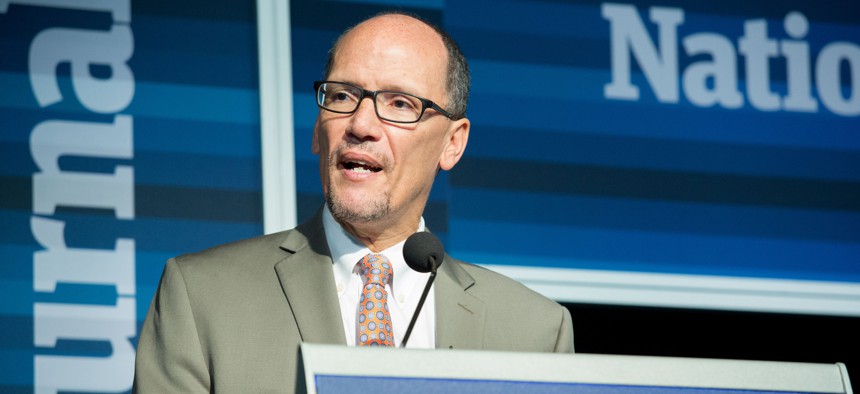
Labor Department
Labor Department Chief Lays Out the Promise (and Problem) With Apprenticeships
They are a ladder to prosperity, but they’re suffering from problems of perception.
Apprenticeships are a path to prosperity, and they could be much more so if people would drop their preconceived notions about them, Labor Secretary Thomas Perez said Tuesday.
Perez highlighted a woman he met in Los Angeles: She bounced around jobs, struggled to find a career path, until she landed a union apprenticeship in construction. Now, she’s helping build the city’s new light-rail system, a job Perez said is providing security for her and her three children.
But Perez acknowledged that there’s a mental shift that needs to take place in order to drastically increase apprenticeships, which couple on-the-job training with instruction in a highly skilled occupation. “I think the biggest attitudinal adjustment we have to do with a lot of parents is there are multiple pathways to prosperity,” Perez said. “Apprenticeship is one, a four-year degree is another, community college, etc.”
With this week marking the inaugural National Apprenticeship Week, Perez joined Steve Clemons—The Atlantic’s Washington editor-at-large—to discuss how apprenticeships help launch Americans into the middle class at a National Journal LIVE event at the Newseum titled “Conversation with U.S. Secretary of Labor.”
In September, President Obama announced that the Department of Labor had awarded $175 million in American Apprenticeship Grants to 46 public-private partnerships in an effort to train more than 34,000 people over the next five years. In his opening remarks, Perez highlighted this investment and said apprenticeship should be expanded into other high-growth areas, such as health care, information technology, and cybersecurity. Obama’s goal, stated in his 2014 State of the Union address, is to double the amount of apprenticeships by 2019—a mantra Perez called “double and diversify.”
“We know apprenticeship works,” Perez said. “The ‘earn while you learn’ model is tried and true.”
Some have a mind-set that the choice is either college or an apprenticeship, yet the two should be integrated, Perez said. He pointed to the fact that more than 200 colleges are participating in the Registered Apprenticeship College Consortium, which gives college credits to those who are doing apprenticeships.
Another shift that needs to take place is in the way Americans get hired. It’s quite common, Perez said, for Americans to get jobs through their own networks. “In my experience, the informal grapevine has not been friendly for people of color—that has not worked as well for them. And so we need to move away from that informal grapevine. … [We need] to move into a world in which people are truly judged by the content of their character.”
Perez then brought the conversation full circle, saying that he believes apprenticeships not only help Americans reach the middle class, but that they provide much more.
“That’s why in our world of apprenticeship, we’re not simply trying to grow the quantity of apprenticeship,” Perez said. “We’re trying to change the face of apprenticeship because zip codes should never determine destiny.”
NEXT STORY: VA Moves to Punish Senior Executives







